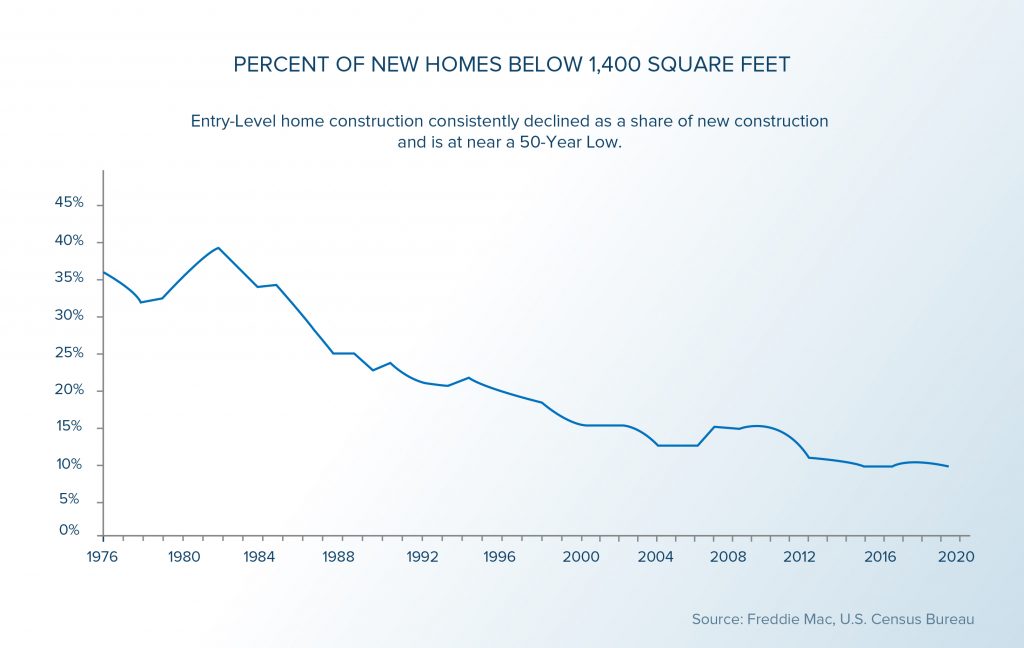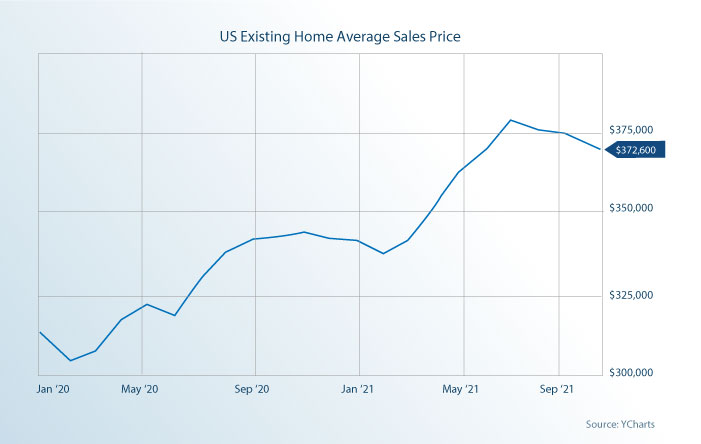Nelson Capital Management


The COVID-19 pandemic sparked a massive run-up in the housing market as mortgage rates fell and demand surged, while inventory levels reached record lows. The spike in demand can be attributed to several short and long-term trends. First, millennials are increasingly forming households and entering the home buying market, further exacerbating the extreme shortage in starter homes as evidenced by data from Freddie Mac and the Harvard State of the Nation’s Housing 2021 study. Increased popularity of remote work has driven many to seek larger homes with a dedicated workspace. Lastly, relative to prior generations, more baby boomers have opted to age in place, meaning they are accommodating their existing homes to meet their evolving needs rather than moving to a smaller homes, care facilities or in with other family members. Nelson Capital’s portfolio is positioned to benefit from the housing boom through our exposure to D.R. Horton (tkr: DHI) and Equity Residential (tkr: EQR).
 D.R. Horton, the largest homebuilder in the U.S. by volume, constructs and sells mostly single-family homes designed primarily for the entry-level and move-up markets. It operates in the Midwest, Mid-Atlantic, Southeast, Southwest, and Western regions of the U.S. The company sells about 65,000 homes per year with an average selling price of around $300,000. D.R. Horton has four brands that each cater to a different demographic. Express Homes focuses on price-conscious entry-level buyers and represents about 30% of homes sold. D.R. Horton Homes, the most dominant brand, focuses on first-time buyers and move-up buyers. This brand spans 96 markets across 30 states and represents 66% of homes sold. The Freedom Homes brand builds active adult communities designed for older adults who are generally able to care for themselves. This brand represents 3% of homes sold. Just 1% of homes sold are attributable to its smallest brand, Emerald Homes, which caters to the higher end of the housing market.
D.R. Horton, the largest homebuilder in the U.S. by volume, constructs and sells mostly single-family homes designed primarily for the entry-level and move-up markets. It operates in the Midwest, Mid-Atlantic, Southeast, Southwest, and Western regions of the U.S. The company sells about 65,000 homes per year with an average selling price of around $300,000. D.R. Horton has four brands that each cater to a different demographic. Express Homes focuses on price-conscious entry-level buyers and represents about 30% of homes sold. D.R. Horton Homes, the most dominant brand, focuses on first-time buyers and move-up buyers. This brand spans 96 markets across 30 states and represents 66% of homes sold. The Freedom Homes brand builds active adult communities designed for older adults who are generally able to care for themselves. This brand represents 3% of homes sold. Just 1% of homes sold are attributable to its smallest brand, Emerald Homes, which caters to the higher end of the housing market.
 After the Great Recession, many homebuilders scaled back operations or simply went out of business. D.R. Horton is one of the few public homebuilders that pays a dividend (0.9% dividend yield), and was able to maintain that dividend throughout the housing crisis, demonstrating its dominance in the market. Following the housing crisis, D.R. Horton adopted a “land-light” strategy with contracts that require a small deposit up front in exchange for the right, but not the obligation, to buy land or lots at predetermined prices when the company is ready to begin development. This strategy substantially reduces the risks associated with land ownership and enables D.R. Horton to control land and lot position with limited capital investment. Supply chain disruptions, rising raw material costs and a tight labor market may impact margins in the short term, but the demand for new housing remains robust, enabling D.R. Horton to pass on additional costs to consumers. Though there is some concern that the current housing conditions could be a bubble, this boom is much more stable than the previous bubble due to tighter underwriting standards, higher credit scores, larger down payments, and lack of housing supply.
After the Great Recession, many homebuilders scaled back operations or simply went out of business. D.R. Horton is one of the few public homebuilders that pays a dividend (0.9% dividend yield), and was able to maintain that dividend throughout the housing crisis, demonstrating its dominance in the market. Following the housing crisis, D.R. Horton adopted a “land-light” strategy with contracts that require a small deposit up front in exchange for the right, but not the obligation, to buy land or lots at predetermined prices when the company is ready to begin development. This strategy substantially reduces the risks associated with land ownership and enables D.R. Horton to control land and lot position with limited capital investment. Supply chain disruptions, rising raw material costs and a tight labor market may impact margins in the short term, but the demand for new housing remains robust, enabling D.R. Horton to pass on additional costs to consumers. Though there is some concern that the current housing conditions could be a bubble, this boom is much more stable than the previous bubble due to tighter underwriting standards, higher credit scores, larger down payments, and lack of housing supply.
The current housing market has made it difficult for some people seeking to buy a home. Rising prices mean higher down payments, which is the biggest hurdle for most first-time home buyers. Competition is fierce and some buyers put down 50% or even submit all-cash offers with zero contingencies. This has priced many other potential buyers out of the market as affordability moves beyond reach and they must to continue to rent.
 Equity Residential, one of the leading residential REITs (Real Estate Investment Trust), acquires, develops, and manages luxury rental apartment properties. Most of Equity Residential’s properties are located in urban coastal markets, where residential REITs were hardest hit, resulting in significant drops in rent prices and generous concessions to attract new tenants. Residential REITs with Sunbelt exposure fared better during the pandemic as remote work drew people to more inland regions with a lower cost of living. Equity Residential is ramping up its exposure in Sunbelt states to diversify its portfolio, selling some older properties in California in favor of much newer properties in high-growth regions such as Austin, Dallas, and Atlanta. The company recently announced a strategic partnership with Toll Brothers (tkr: TOL) to develop apartment communities in key Equity Residential expansion markets.
Equity Residential, one of the leading residential REITs (Real Estate Investment Trust), acquires, develops, and manages luxury rental apartment properties. Most of Equity Residential’s properties are located in urban coastal markets, where residential REITs were hardest hit, resulting in significant drops in rent prices and generous concessions to attract new tenants. Residential REITs with Sunbelt exposure fared better during the pandemic as remote work drew people to more inland regions with a lower cost of living. Equity Residential is ramping up its exposure in Sunbelt states to diversify its portfolio, selling some older properties in California in favor of much newer properties in high-growth regions such as Austin, Dallas, and Atlanta. The company recently announced a strategic partnership with Toll Brothers (tkr: TOL) to develop apartment communities in key Equity Residential expansion markets.
At the onset of the pandemic, eviction moratoriums prevented landlords from removing tenants who were facing financial hardships. The expiration of these eviction moratoriums in August 2021 has not lead to mass evictions as once feared. Government programs have provided rental assistance to thousands of tenants, softening the impact to both tenants and landlords. Equity Residential has received $18.3M in governmental assistance payments so far this year.
As the pandemic abates, Equity Residential has seen occupancy and pricing trends improve while concessions are back in line with pre-pandemic levels. Renewal rates are exceeding expectations with little discrepancy in renewal behaviors for deal seekers who received significant discounts and more tenured residents. However, 86% of residents are locked into paying rents that are significantly below market prices. 2022 is expected to be a turning point for Equity Residential as many of these leases come up for renewal at more normalized rates and companies require workers to return to offices.
In addition to the imminent rebound in pricing that is expected to boost margins, continued investments in technological advancements such as Equity Residential’s AI Chatbot named “Ella” are optimizing efficiencies, leading to reduced staffing expenses and enhanced customer experiences. Equity Residential also pays shareholders a solid 2.85% dividend.
Individual investment positions detailed in this post should not be construed as a recommendation to purchase or sell the security. Past performance is not necessarily a guide to future performance. There are risks involved in investing, including possible loss of principal. This information is provided for informational purposes only and does not constitute a recommendation for any investment strategy, security or product described herein. Employees and/or owners of Nelson Capital Management, LLC may have a position securities mentioned in this post. Please contact us for a complete list of portfolio holdings. For additional information please contact us at 650-322-4000.
Receive our next post in your inbox.